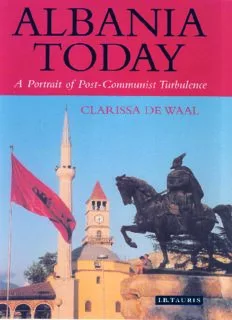
Albania Today: A Portrait of Post-Communist Turbulence PDF
Preview Albania Today: A Portrait of Post-Communist Turbulence
Albania Today Albania Today A Portrait of Post-Communist Turbulence C W LARISSA DE AAL in association with The Centre for Albanian Studies LONDON Published in 2005 by I.B.Tauris &. Co Ltd 6 Salem Road, London W2 4BU 175 Fifth Avenue, New York NY 10010 www.ibtauris.com In association with The Centre for Albanian Studies, London www.albanianstudies.org In the United States of America and in Canada distributed by St Martins Press, 175 Fifth Avenue, New York NY 10010 Copyright © Clarissa de Waal, 2005 The right of Clarissa de Waal to be identified as the author of this work has been asserted by the author in accordance with the Copyright, Designs and Patents Act 1988. All rights reserved. Except for brief quotations in a review, this book, or any part thereof, may not be reproduced, stored in or introduced into a retrieval system, or transmitted, in any form or by any means, electronic, mechanical, photocopying, recording or otherwise, without the prior writ- ten permission of the publisher. ISBN 1 85043 859 5 EAN 978 1 85043 859 5 A full CIP record for this book is available from the British Library A full CIP record is available from the Library of Congress Library of Congress Catalog Card Number: available Printed and bound in Great Britain by TJ International Ltd, Padstow, Cornwall Camera-ready copy edited and supplied by the author Contents List of illustrations vii Chapter 1. Introduction 1 Chapter 2. First Impressions: Dropull 20 Chapter 3. Tirana, 1992 28 Chapter 4. Looking for a fieldwork base 45 Chapter 5. Mirdita and Its History 68 Chapter 6. The Kanun in the 1990s 83 Chapter 7. On the ground in Mirdita:Fan 95 Chapter 8. Orosh 116 Chapter 9. Developments 136 Chapter 10. Village Life 158 Chapter 11. Rrëshen 1 180 Chapter 12. Rrëshen 2 203 Chapter 13. Descent to the plain 227 Chapter 14. Concluding 241 Appendices 249 Endnotes 253 Bibliography 261 Index 263 vii List of Illustrations 1. Orosh,1994 First Easter mass since 1967 143 2. Easter worshippers at the ruined abbey of Orosh, 1994 143 3. Wedding guests 144 4. Women’s burden:wood collecting 144 5. Return at dusk spinning 145 6. Cradle-ties maker drinking coffee 145 “It was a small shabby sort of place. Land was short, jobs were scarce, politics was unstable, health was poor, prices were rising, and life was altogether far from promising, a kind of agitated stagnancy.” Clifford Geertz, 1993, Local Knowledge 1 Introduction i. Doing Ethnography in Albania A few years ago, a Greek political scientist on hearing that I was working in Albania, exclaimed: “That must be an anthropologist’s paradise.” The implication was that formerly isolated and undiscovered Albania afforded the sort of fieldwork experienced by ethnographers at the beginning of the twentieth century; the dissolution of the exotic1 was not after all complete. The anthropologist George Marcus discussing early ethnography writes: “Ethnographies as a genre had similarities with traveller and explorer accounts, in which the main narrative motif was the romantic discovery by the writer of people and places unknown to the reader. To do this, the main motif that ethnography as a science developed was that of salvaging cultural diversity, threatened with global Westernization, especially during the age of colonialism. The current problem is that these motives no longer serve well enough to reflect the world in which ethnographers now work. All peoples are now at least known and charted….” [1986:24] Marcus was writing before the collapse of communism. Since 1989, Western ethnographers working in the poorer regions of former Socialist Europe have been in a situation which in a number of respects echoes that of the ethnographers working in the colonialist era. In the early 1990s, numerous foreign ‘experts’ converged on Tirana. While they were not colonialists in the sense of holding government positions, they were ideological colonialists come to teach the locals how to do things the ‘right way’ according to the tenets of market fundamentalism. They were extremely highly paid by any standards and stratospherically paid by local standards. Furthermore, they received supplementary pay as Albania was officially a dangerous posting. These experts, some of whom were unscrupulous adventurers, were to assist Albania in the switch from command economy to market capitalism. Their job was to show the locals how to set up institutions, financial and legal, to underpin the changes. Within months, institutions which had taken centuries to build in the West, were to be established in a country
Description: